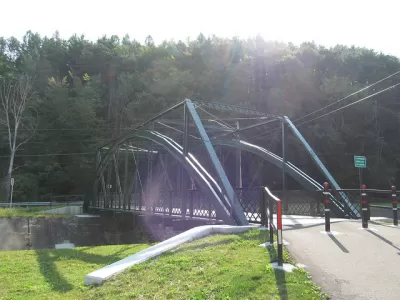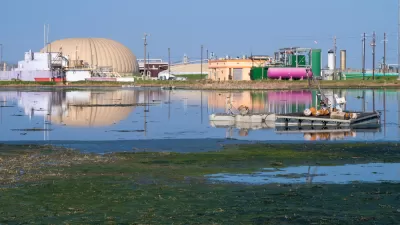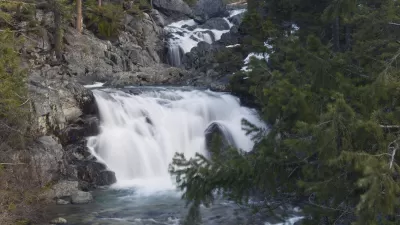Opponents cite environmental risks, supporters hope the facility will boost the economy of a struggling community.

In a sprawling column for the Pittsburg Post-Gazette, Don Hopey reports on the political, cultural and environmental issues surrounding a private company's proposed facility to treat wastewater from fracking operations at an existing sewage treatment plant along the Allegheny River.
"The proposal, which the state Department of Environmental Protection is considering permitting, would allow Epiphany to accept and store truckloads of wastewater — up to 400,000 gallons a day — from shale gas drillers. That water would be injected into a natural gas heated-evaporation and distillation boiler where salts and other chemical contaminants would be removed. Up to 42,000 gallons a day of the remaining water would be piped through the municipal sewage treatment plant, then discharged into the Allegheny River."
Those with serious questions about the project include a typical assortment of conservation organizations, as well as a notable number of government entities including the Pennsylvania Fish & Boat Commission, the New York State DEP, the U.S. Army Corps of Engineers and the U.S. Fish & Wildlife Service.
It's also strongly opposed by the Seneca Nation, whose members have not forgotten the events preceding the construction of the Kinzua Dam, nor have they forgotten that in 1974 their land was "inundated by radioactive waste" from a processing site in West Valley, New York.
Supporters say the fracking operations need somewhere to put wastewater, Hopey writes, and "also note that a more robust drilling presence could help fill the economic hole created when Coudersport-based Adelphia Communications Corp., then the fifth-largest cable company in the U.S., went bankrupt in 2002."
Conflict between the environmental risks and potential economic benefits of fracking have been at the center of the debate across the country. New York State banned fracking, only to have one of its more economically depressed regions threaten to secede.
And though the EPA has determined that fracking can threaten drinking water, it's unlikely the agency will do much about it under the Trump Administration
FULL STORY: At Allegheny River's headwaters, treatment plant for fracking wastewater stirs debate

Alabama: Trump Terminates Settlements for Black Communities Harmed By Raw Sewage
Trump deemed the landmark civil rights agreement “illegal DEI and environmental justice policy.”

Study: Maui’s Plan to Convert Vacation Rentals to Long-Term Housing Could Cause Nearly $1 Billion Economic Loss
The plan would reduce visitor accommodation by 25% resulting in 1,900 jobs lost.

Planetizen Federal Action Tracker
A weekly monitor of how Trump’s orders and actions are impacting planners and planning in America.

Wind Energy on the Rise Despite Federal Policy Reversal
The Trump administration is revoking federal support for renewable energy, but demand for new projects continues unabated.

Passengers Flock to Caltrain After Electrification
The new electric trains are running faster and more reliably, leading to strong ridership growth on the Bay Area rail system.

Texas Churches Rally Behind ‘Yes in God’s Back Yard’ Legislation
Religious leaders want the state to reduce zoning regulations to streamline leasing church-owned land to housing developers.
Urban Design for Planners 1: Software Tools
This six-course series explores essential urban design concepts using open source software and equips planners with the tools they need to participate fully in the urban design process.
Planning for Universal Design
Learn the tools for implementing Universal Design in planning regulations.
Caltrans
Smith Gee Studio
Institute for Housing and Urban Development Studies (IHS)
City of Grandview
Harvard GSD Executive Education
Toledo-Lucas County Plan Commissions
Salt Lake City
NYU Wagner Graduate School of Public Service




























